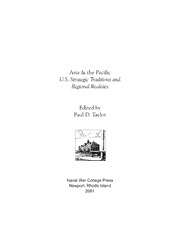Table Of ContentAsia & the Pacific
Report Documentation Page Form Approved
OMB No. 0704-0188
Public reporting burden for the collection of information is estimated to average 1 hour per response, including the time for reviewing instructions, searching existing data sources, gathering and
maintaining the data needed, and completing and reviewing the collection of information. Send comments regarding this burden estimate or any other aspect of this collection of information,
including suggestions for reducing this burden, to Washington Headquarters Services, Directorate for Information Operations and Reports, 1215 Jefferson Davis Highway, Suite 1204, Arlington
VA 22202-4302. Respondents should be aware that notwithstanding any other provision of law, no person shall be subject to a penalty for failing to comply with a collection of information if it
does not display a currently valid OMB control number.
1. REPORT DATE 2. REPORT TYPE 3. DATES COVERED
12 JUN 2000 N/A -
4. TITLE AND SUBTITLE 5a. CONTRACT NUMBER
Asia-Pacific Forum
5b. GRANT NUMBER
5c. PROGRAM ELEMENT NUMBER
6. AUTHOR(S) 5d. PROJECT NUMBER
5e. TASK NUMBER
5f. WORK UNIT NUMBER
7. PERFORMING ORGANIZATION NAME(S) AND ADDRESS(ES) 8. PERFORMING ORGANIZATION
Naval War College 686 Cushing Road Newport, RI 02841 REPORT NUMBER
9. SPONSORING/MONITORING AGENCY NAME(S) AND ADDRESS(ES) 10. SPONSOR/MONITOR’S ACRONYM(S)
11. SPONSOR/MONITOR’S REPORT
NUMBER(S)
12. DISTRIBUTION/AVAILABILITY STATEMENT
Approved for public release, distribution unlimited
13. SUPPLEMENTARY NOTES
14. ABSTRACT
15. SUBJECT TERMS
16. SECURITY CLASSIFICATION OF: 17. LIMITATION OF 18. NUMBER 19a. NAME OF
ABSTRACT OF PAGES RESPONSIBLE PERSON
a. REPORT b. ABSTRACT c. THIS PAGE UU 135
unclassified unclassified unclassified
Standard Form 298 (Rev. 8-98)
Prescribed by ANSI Std Z39-18
Asia-Pacific Forum
Naval War College, Newport, R.I.,
11–12 June 2000
Asia & the Pacific
U.S. Strategic Traditions and
Regional Realities
Edited by
Paul D. Taylor
Naval War College Press
Newport, Rhode Island
2001
NavalWarCollegePress
Code32,NavalWarCollege,686CushingRoad
Newport,R.I.02841-1207
LibraryofCongressCataloging-in-PublicationData
Asia&thePacific:U.S.strategictraditionsandregionalrealities/editedbyPaulD.Taylor.
p.cm.
ISBN1-884733-15-8
1.UnitedStates—Militarypolicy—Congresses.2.PacificArea—Strategic
aspects—Congresses.3.Asia—Strategicaspects—Congresses.4.United
States—Relations—PacificArea—Congresses.5.United
States—Relations—Asia—Congresses.6.PacificArea—Relations—United
States—Congresses.7.Asia—Relations—UnitedStates—Congresses.
I.Taylor,PaulD.
(PaulDaniel),1939–
UA23.A7352001
327.7305—dc21
00-068699
PrintedintheUnitedStatesofAmerica
The Asia-Pacific Studies Group
The Asia-Pacific Studies group acts as a catalyst, coordinator, and
implementorofresearchtoservetherequirementsoftheU.S.Navy,
the U.S. Pacific Command, and other elements of the U.S. govern-
ment responsible for formulating American policy, strategy, and
plansrelatedtoAsiaandthePacific.Itjoinstogetherthosepersonnel
oftheNavalWarCollegeandtheNavyWarfareDevelopmentCom-
mand who are engaged in work on Asia and the Pacific.
Disclaimer
The contents of this volume are the views of the authors. They are
notnecessarilyendorsedbytheU.S.NavalWarCollegeoranyother
organization or agency of the U.S. government.
CONTENTS
Foreword
ViceAdmiralArthurK.Cebrowski,U.S.Navy ........... ix
Preface
PaulD.Taylor ................................... xi
Acknowledgements.................................. xv
The Strategic Traditions of the United States
in the Asia-Pacific Region
StephenPeterRosen ............................... 1
Strategic Trends in the Asia-Pacific Region
Paul Dibb ...................................... 9
An Assessment of the “Objective” Political Conditions
That Pertain in the Asia-Pacific Region
AbramN.Shulsky ................................ 29
Understanding Changes in Asia’s Economic Landscape
Leif Rosenberger ................................. 51
The Military Dimensions of Great-Power Rivalry
in the Asia-Pacific Region
JohnR.Landry................................... 83
Roundtable: Net Assessment—Objective Conditions
versus the U.S. Strategic Tradition
Robert Sutter.................................... 97
Michael McDevitt................................ 101
Jonathan Pollack ................................. 107
Appendix.......................................... 115
Contributors,andtheEditor ........................... 117
FOREWORD
C
ARLVONCLAUSEWITZtaughtthatanyonewhoplansstrategy
beforehehasachievedacleardefinitionofpolicygoalsputsthe
cart before the horse. It is equally true that it makes no sense for a
countrytotrytodevelopitsforcesorplanoperationswithouttaking
accountoftheuniquecharacteristicsthatdefineandshapeitspoten-
tial adversaries and available allies.
Forthesereasons,weattheNavalWarCollegehaveplacedspecial
emphasis on understanding the Asia-Pacific region. The economic,
political,anddemographicdynamicsofthatareamakeclearitsim-
portancetoachievingglobalU.S.objectives.Atthesametime,con-
tinued tensions related to the Korean Peninsula, issues between
ChinaandTaiwanandbetweenIndiaandPakistan,aswellasunrest
withinIndonesiaunderscoreimportantthreatstostabilityinthere-
gion. Its vast territory and expanses of ocean make the Asia-Pacific
regionfundamentallyamaritimetheaterandtheU.S.Navyacentral
playerinanymilitaryoperationstodefendtheinterestsoftheUnited
States.
The Asia-Pacific Forum, from which the papers that follow are
taken, brought together a distinguished collection of scholars and
policypractitionerstoexaminethepolitical,economic,andmilitary
realitiesoftheAsia-PacificregioninthecontextoftheU.S.strategic
tradition.Theyprovedthatfamiliarmilitarythinkingaboutsomeim-
portant questions might have become obsolete.
Inhiskeynoteaddress,forexample,Prof.StephenP.RosenofHar-
vardrecalledthatmilitaryconventionalwisdomaboutAsiahadsug-
gested that nuclear weapons do not matter, that offense dominates
defense,thattheallieswillalwaysbewithus,andthateventhough
Asiamightbefaroff,we“knowhowtogetthere.”Infact,however,
Professor Rosen noted, the current reality is not quite like that.
Toughquestionsariseifallofourpotentialenemiesandsomeofour
friendsinthetheaterhavenuclearweapons.Offenseisdesirable,but
it is an option only if one can fight from sanctuary; the balance be-
tweenoffenseanddefenseisshifting.Someofthebasingpatternsare
alsoinquestion,andsoweneedtorethinkassumptionsthathaveun-
derlain our forward presence.

